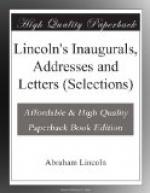Although the stories, then, have but little direct bearing upon Lincoln’s writings, they are so characteristic a feature of the man that they cannot be wholly disregarded. In the two cases already noted the stories were illustrative, and this appears to be true of all of Lincoln’s anecdotes, whether they occur in his conversation or in his writings. He apparently never dragged in stories for their own sake, as so many conversational bores are in the habit of doing, but the story was suggested by or served to illustrate some incident or principle. Indeed, in aptness of illustration Lincoln has never been surpassed. Emerson said of him: “I am sure if this man had ruled in a period of less facility of printing, he would have become mythological in a very few years, like Aesop or Pilpay, or one of the Seven Wise Masters, by his fables and proverbs.” Many of the anecdotes attributed to Lincoln are undoubtedly to be referred to other sources, but the number of authentic stories noted, especially during the presidency, is very large.
The question has often been raised whether Lincoln originated the stories he told so well. Fortunately we have his own words in this matter. To Noah Brooks he said: “I do generally remember a good story when I hear it, but I never did invent anything original. I am only a retail dealer.” Slightly differing from this, though probably not contradicting it, is Lincoln’s statement to Mr. Chauncey M. Depew: “I have originated but two stories in my life, but I tell tolerably well other people’s stories.”
During the Civil War Lincoln’s stories served a special purpose as a sort of safety valve. To a Congressman, who had remonstrated with him for his apparent frivolity in combining funny stories with serious discussion, he said: “If it were not for these stories I should die.” The addresses of the presidential period, however, with the exception of a few responses to serenades, are entirely without humorous anecdotes. Although Lincoln never hesitated to clear the discussion of the most momentous questions through the medium of a funny story, his sense of official and literary propriety made him confine them to informal occasions.




